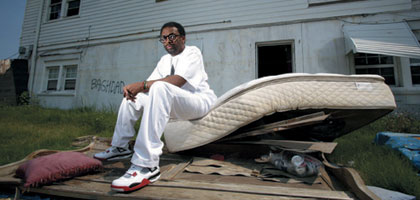-
Architecture
archive
art
Ballard
body
China
cinema
ecology
education
Europe
Ezra Pound
futurology
gothic
image
law
Literature
London
magic
memory
Modern
Modernism
museums
music
novel
performance
photography
poetry
politics
radical philosophy
science
science fiction
Sinclair
Situationism
sound art
Surrealism
technology
television
the avant-garde
The Future
Theory
thomson
time
Urban
visual culture
war
Posts tagged memory
Southern Visual Legacy seminar, Weds 27th
Tagged as cinema, memory, photography

Wednesday 27 November, 4.00 pm
Room 106, University of Westminster, 106 Wells Street , London W1T 3UW
Christopher Lloyd, Goldsmiths, University of London
‘Looking at the “Southern Visual Legacy” in Spike Lee’s When the Levees Broke’
What are we to do with images of death that remind us of, and insist that we recall, other deathly cultural memories? What ethical obligations do we have to see death in larger ocular frameworks? These broad questions frame my analysis, which looks at a selection of photographs shown in Spike Lee’s documentary When the Levees Broke. Charting Hurricane Katrina and her aftermath, the film reveals the biopolitical life (and death) of Southerners in New Orleans and the Gulf region. More specifically, African-American life is revealed by Lee to be precariously entwined in the region’s historical and cultural contours. The images of African-American death that we see in the documentary, I argue, trigger visual memories of other pictures of corporeal trauma from the region’s past. If, as Katherine Henninger argues, ‘photographers and photographs in the South constitute a vast visual legacy: a complex series of continuities and ruptures that help shape southern identity itself’, then we must attend to such connections across Southern visual culture. My paper aims to contribute to this process, illuminating some of the memorative links between the photographs of dead black New Orleanians in When the Levees Broke with, particularly, lynching photographs and the image of Emmett Till in his coffin. In making explicit the ‘Southern visual legacy’ of Lee’s film, we might not only contribute insight into the debates on Southern identity and regionalism in the twenty-first century, but also signal ways of reading images of African-Americans through broader historical and cultural frames.

October 16th 2013
University of Westminster, room 106, Wells Street, London W1T
Jessica Rapson, Kings College London
‘Closely Allied Structures: Ecocriticism, Genocide and Representation in the wake of the Holocaust’

Memory and Restitution
Friday 5 July, 9.30-6.30 and Saturday 6 July, 9.30-1.30, 2013,
The Boardroom, University of Westminster, 309 Regent Street, London W1B
Full programme at: www.memoryandrestitution.co.uk/programme/
Keynotes: Stef Craps (Ghent), Lyndsey Stonebridge (UEA) and Anna Reading (King’s College London)
Panels on: Restitution and Resistance; Landscapes of American Memory; The Natural History of Memory; Transcultural Memory After 9/11; Rethinking Restitution
Following recent attention to the “cosmopolitan” or “multidirectional” dimensions of memory, this colloquium foregrounds commemorative practices as global positioning systems that enable individuals and collectives to situate themselves (temporally and spatially, emotionally and intellectually, politically, and ethically) in relation to others. Interrogating the implicit hierarchies of life encoded in disparate forms of historical reckoning, the colloquium considers whether it is possible to imagine a universal model of restitution, or whether processes of redress are necessarily a product of the cultural and historical context in which they arise.
Organised by: Lucy Bond (Westminster), Rick Crownshaw (Goldsmiths) and Jessica Rapson (Goldsmiths)
Co-sponsored by the Institute for Modern and Contemporary Culture and Goldsmiths
Admission is free, but please reserve a place: info@memoryandrestitution.co.uk
Spaces of Reckoning: Interdisciplinary Approaches to Conflict and Memory
Call for participants
Saturday 3 December 2011, University of Westminster, London
UPDATE: new website for the symposium at: http://www.spacesofreckoning.co.uk/
Both Conflict Studies and Memory Studies have, in recent years, become of increasing interest across the Humanities and Social Sciences, as they generate compelling dialogues between fields of study and build on the interdisciplinary turn in contemporary academe. This event will create a space that will allow for two things. The first is the development of opportunities for discussion across academic and cultural spheres. This will come about through the analysis and presentation of the representations and conceptualizations of violent conflict and memory addressed by emerging scholars seeking new networks and approaches to research. Secondly, it will include voices from outside academia that can provide new insight and potential empirical challenges to theoretical discussion.
The event will gather together new researchers, and is especially designed to bring together individuals from disciplines that do not traditionally intersect (e.g. Visual Culture and Socio-Legal Studies). The conference will allow mutually beneficial input and new ways of addressing the praxis of Conflict and Cultural Memory through the presentation of and analysis of both objects and concepts. When reflecting on the proposed theme, Post War Reckoning, Memorialisation, Institutions, Artefacts and the Semiotics of Collective Memory, for example, offer a wide territory for investigation, especially when combined with the study of cultural representations of these themes. We are seeking interested participants from across and outside the academic spectrum to contribute to the creation of new and productive dialogues.
Please submit up to 200 Word abstracts for 20 minute papers / presentations by November 10th 2011 to the organisers:
Marija Katalinic, Department of English, Linguistics and Cultural Studies: marijakat@gmail.com
Tallyn Gray, Department of Advanced Legal Studies: tallyn.gray@my.westminster.ac.uk


The Institute for Modern and Contemporary Culture
University of Westminster Department of English, Linguistics and Cultural Studies
32-38 Wells Street, London W1T 3UW. United Kingdom.
